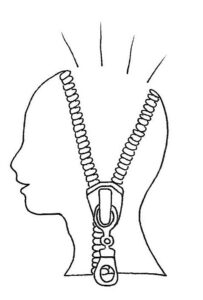The following quote came from James Clear in his January 2020 newsletter (https://jamesclear.com/3-2-1). “Reading is like a software update for your brain. Whenever you learn a new concept or idea, the ‘software’ improves. You download new features and fix old bugs.”
He says your past is fixed, but your interpretation of it can change depending on the software you use to analyze it. That got me thinking about how we each have different perspectives. In previous blog posts (example https://janetgregory.ca/im-right-im-wrong-all-the-time/), I’ve talked about how it is important to have different people in a conversation to help mitigate confirmation bias.
This morning I read a blog post “Failure Am I” by James Thomas, which really did get me thinking about my own perspective on failures. You can read his post here: https://qahiccupps.blogspot.com/2020/01/failure-am-i.html .
In general, I agreed with the principle that we learn from our failures, but something had bothered me about it – I just wasn’t sure what. I stopped saying “fail fast” (a very common term used in agile development) and started using the term “learn fast” instead, because it felt better to me.

In his post, James Thomas put my mixed feelings into words and his post truly felt like a “software update”. He makes a point saying we don’t have to “fail” to learn. That was what I was missing and hadn’t been able to articulate. Another sentence from Thomas’ post which wasn’t new to me, “learning from an action — positive or negative — requires reflection,” is also a critical piece of the puzzle. The read wasn’t a complete reboot, but it was something that made me look at the world a little bit differently and updated my ideas so I will be able to articulate how I feel about failure and learning better.
 As a tester, (or any other development role), I think it is especially important to be open to new ideas, either by learning something new or editing old thoughts and understandings. Read, take courses, have open conversations, but I think the most important aspect, is to reflect on what you have learned, whether it was the result of failing, succeeding or something in between. Oh, … and maybe write about it too.
As a tester, (or any other development role), I think it is especially important to be open to new ideas, either by learning something new or editing old thoughts and understandings. Read, take courses, have open conversations, but I think the most important aspect, is to reflect on what you have learned, whether it was the result of failing, succeeding or something in between. Oh, … and maybe write about it too.
Based on this little thought experiment, I find myself agreeing with James Clear – we can indeed change our own perspectives. I think it is important to be open to new ideas, either by learning something new or editing old thoughts and understandings.
A question to ponder and to close with – Is it possible to challenge ourselves with our own ideas, to reboot ourselves and change our own software, or do we need to inject someone else’s ideas to adapt?
8 comments on “Can we change our perspectives?”
An addendum to my post. I am a fan of small chunks of functionality being released to production to mitigate risk. This morning I had a conversation with my UX designer – I went into the conversation with the intent of convincing her “my way” was correct. However, I stopped, listened, and understood her issues and we compromised. It is hard to “edit” beliefs, but I keep trying.
–Janet
Thanks, Janet. It’s interesting how you use the term “reboot”. I remember how I worked with the CP/M operating system of my computer back in the late 80’s. It booted off a floppy disc. It wasn’t a slow process, but there was a number of steps involved in the loader, BIOS, BDOS, COM. It always rebooted into the same state, howevever. It never learnt anything, unless I programmed it to.
Human rebooting is obviously different. For me, and I think for most introverted people, “rebooting” the way you talk about it takes sleep, excercise, time away, reading, philosophy, therapy, doing dishes, a shower, running, cycling, repairing the car, gardening, dog walking. Discussions or deep conversations with others work too, but to a lesser extent. Much of that happens in ourselves. We’re always alone with ourselves, as some say.
I think it’s impossible, however, to reboot entirely alone. Even introverts are social creatures and if constructivism is just a bit right, our thinking is never completely individualized and internalized, but always to a certain level collective.
But my point is that we can surely do a lot alone: We can think and reflect, and we even have gut feelings about our own reflections: Judge them. Go to sleep thinking and reflecting deeply, and tomorrow morning your thoughts will surely be rebooted. Not only will sleep make us less tired, our brains work just as hard when we sleep as when we’re awake. We’re just not conscious, it’s other parts working (the “default mode network”).
About your added comment, I have a question: Can we really *reboot* if we only expose ourselves / release small chunks? What happened to the power of revolution? I’m thinking about Greta Thunberg right now – like her or not, she has rebooted a lot of people’s thinking though releasing big bangs. It’s social and all software. Listening, to us individualists, is a lot harder than talking.
Warm regards,
Anders
Thanks Anders, My original draft had a bit about constructivism, but got a bit too much so I took it out. I believe most (if not all) ideas do not happen in a vacuum.
I hadn’t really thought about reboot (as in a PC) – going back to the way we started. Perhaps we could think about it as being open minded instead. Resisting the urge to think we know it all.
You have given me food for thought, and I’m glad I was able to give you some as well. Personally, I think it is good to sit back and ponder ideas.. and input from others can only help.
Hi Janet, a massive head nod from me. I think as we collect wisdom we also become entrenched in our views which sometimes makes it harder to get a new perspective. Recently I’ve had a profound mindshift brought to me by somone who gently helped me see a different viewpoint. No failure involved.
Perhaps what we need is struggle though? We need a situation where our old ideas and approaches are not working any more? I find that definitely helps me to learn?
thanks for writing Anne-Marie
Thanks Anne-Marie, Interesting thought about a struggle being needed to explore new ideas. What happens if you don’t think you need to change? Is it still possible to consider different perspectives?
Hi Janet, the more time I spend with people in teams the more I believe that discussion, listening and great collaboration produce better outcomes. The more open you can make yourself to new ideas the better the outcome for the solution being developed. I’m losing count of the times I’ve gone to a meeting thinking I had a great way to proceed only to change direction significantly when others chipped in information that was new to me or considered in a different way. I also think of idea sharing as a major risk mitigation strategy, a way we find new questions to ask, things to explore and ultimately deliver better solutions for our customers.In my mind the approach you explored in your blog is absolutely a growth strategy.
Thank you. I really like the idea of sharing ideas as a risk mitigation strategy.
You have explained it really well. One of the best ways to start thinking differently is to change your perspective and look at things from a different point of view. If you look at life’s problems in this same way, by visualizing yourself up close as well as far away from the problem, you can begin to see new things. You can see the details in a new way. You may find that things aren’t as they seem right now. Or you may find just the exact detail you need for your next step. You begin to open the mind to new details and new paths and perspectives.
See if you don’t find your mind more open to new things and yourself more willing to entertain new ideas